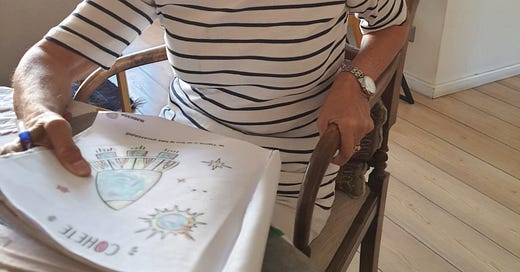“Many experts have described how Alzheimer's progressively gets worse stage by stage. I believe my wife is at the beginning of the last stage, although she maintains a mix of abilities and inabilities that confuse what stage she is in. For example, she is unable to speak, but she still has good mobility and can walk without much difficulty. She loves walking to the plazas. She still has good muscle control. Furthermore, she is not bedridden by any means.
She lacks autonomy when requiring the bathroom and is unable to shower or dress herself. However, she eats and drinks quite well, only with a little help controlling the amount of food she puts in her mouth. As we prepare her food, her swallowing has improved, which makes it easier for her to swallow. She just learned how to brush her teeth again. She does not embarrass us in public, but we do have to watch her hand movements sometimes to avoid touching parts of her body. Her personality has never changed, on the contrary, she has become more affectionate and sweeter than ever before. Her affectionate gestures could be a spontaneous kiss, hugging me, arranging my collar in the elevator, cuddling up to me on the park bench, or putting her head on my shoulder. When my son makes a video call from France and sends a kiss with his hand, she responds in kind or even kisses my cell screen to be certain he receives it.
She identifies all the members of her immediate family. She is happy to see me in the morning and holds on to my hand when I am putting her to bed at night. Her right hand is trembling more often, which can be a signal of the advancement of this disease, but on the other hand, I am also getting fewer blank “lost” looks from her, which means we are connecting much more easily. So, what stage are we in? She doesn't fit exactly into the last stage just because she can't speak. There are simply no two Alzheimer's behavioral reactions alike. There are always differences.
It doesn't matter. You know what? She seems to be getting progressively better, not worse. She is not supposed to, right? For example, she is walking autonomously now without losing her balance, as she was before her infections. Her concentration in her therapy sessions has improved significantly, enabling her to write or copy words and numbers more clearly. She is able to recognize objects in the kitchen, as she washes dishes by hand, sweeps the kitchen floor, helps make the bed, passes the vacuum cleaner, etc. Her integration into these household chores is, of course, supervised and assisted. She is beginning to let us know when she needs the bathroom, not always, but a huge start.
So how do we explain this? The only explanation is that God heard my desperate cry for help. There is no doubt in my mind that there is a helping hand from him. There is no other explanation for progress and not regression, as everyone points out at this stage of the disease. Ok, ok…it may not last forever, but what a relief.
I have always been a denier when it comes to the huge negative odds of what I am trying to achieve. I have always believed I could be the exception and make things work out despite the odds against my efforts. Nevertheless, I was usually defeated.
Denial of the negative odds is part of my DNA, and this won't change. This is why I am in the fight for my wife with Alzheimer's, not to necessarily defeat it, but to deny the shutdown for many more years to come. Of course, I need God's help, coupled with my dedication, to become the impossible exception. She has survived three serious urinary infections, falling into an unconscious state in the first and, coupled with Covid-19, incurring pneumonia and requiring oxygen to help her breathe. To summarize, she was not expected to make it, however, she did. My stubbornness to deny Alzheimer's final verdict is now more justified than ever before because of this.
Obviously, this progress and her ability to recover against many odds gives me hope every morning when I wake up. It may be a false one, but it is all I have, and I am going to hold on to it as long as possible because it has become my motivation for living. Besides, I could see in her silence, she was trying to live. I will fight with her for that. Hope, as illegitimate as it may be, and denial are my best defense mechanisms against deep depression, not always effective, but certainly most of the time. I just try not to think of anything else to avoid that pitfall.
As there are no two Alzheimer's victims alike, there are no two caregivers alike. We are all different in the way we react. That is why there isn't a “supposed to-do list” to follow. Our patience levels vary, as do the personal tools we apply because we are all dealing with very different behavior changes.
This is why in support groups where we share problems and possible answers we always get “try this, try that, what worked for you didn't work for me” dialogue. These tips are important and many times work, but there is no guarantee. Alzheimer's has affected different histories, idiosyncrasies, habits, and capacities in different ways and with different degrees of severity. Caregivers should listen and consider all alternatives, but ultimately, they only have trial and error experience to rely on as their guide.”




